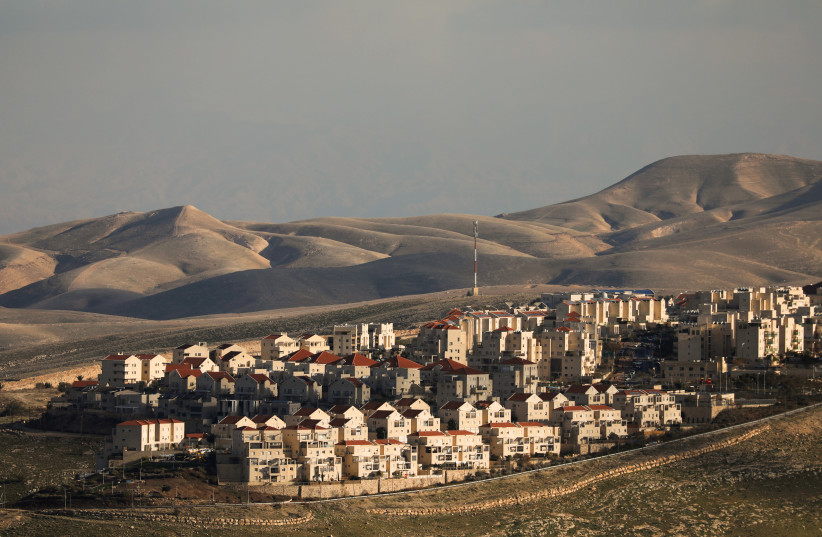The government fast-tracked the approval process for West Bank settler homes, removing diplomatic safeguards that have been in place for almost three decades, at Sunday’s cabinet meeting.
“This is a historic decision that changes the treatment of the settlements in Judea and Samaria” and helps normalize it so that it is more akin to the process “in all of Israel,” Binyamin Regional Council head Israel Ganz said.
“Residents of Judea and Samaria have the right to build and develop without piling up unnecessary difficulties,” Ganz claimed. This step turns “construction in the settlements into something that is not news, but routine,” he added.
Israeli prime ministers and defense ministers have kept a tight hold on the process to avoid diplomatic and security crises that might arise over opposition to enhanced settlement. This has been widely condemned by international allies, most particularly in recent months by the Biden administration.
The government moved on the matter as US Assistant Secretary of State for Near Eastern Affairs Barbara Leaf was due in Israel and Prime Minister Benjamin Netanyahu is at odds with President Joe Biden over Iran.

US State Department spokesman Matthew Miller said the US was "deeply troubled" by Israeli settlement building and changes to the planning system "that may expedite approvals. Settlement expansion is an obstacle to peace."
According to a 1996 cabinet decision, upper-echelon approval was needed at each stage of the process. On Sunday, the government amended the process so that only initial approval is required and there is no longer any formal procedure in place to involve Netanyahu or Defense Minister Yoav Gallant.
The oversight granted to Gallant to approve projects has been transferred to Finance Minister Bezalel Smotrich (Religious Zionist Party), who holds a ministerial post within the Defense Ministry and who, according to the coalition agreement, is in charge of civilian affairs in Area C of the West Bank.
“We will continue to develop the settlements and strengthen the Israeli hold on the territory.”
Bezalel Smotrich
Halting Palestinian takeover of land in Area C
The left-wing group Breaking the Silence tweeted that “until today, it took [four] approvals by the defense minister and the IDF to legally build [and] expand settlements.” This change, it stated, “wiped out of the four stages in the process, giving unprecedented power to Smotrich – a settler MK who wants to make the [West Bank] part of ‘Greater Israel,’” the group stated.
The left-wing group Peace Now warned that the change would enable unrestricted settlement construction and perpetuate de facto annexation of West Bank territory. It noted that often initial approvals for projects were granted without any public notice. The new procedure would not allow an opportunity for opponents to participate in the process, it added.
“The Israeli government’s current path toward de facto annexation must be met with resolute opposition,” Peace Now said.
Jordan’s Foreign Ministry immediately condemned the move, stating that settlement expansion is a grave breach of international law.
Development of the Negev and Galilee and National Resilience Minister Yitzhak Wasserlauf (RZP) lauded the amended procedure, stating that “the time has come to promote construction in Judea and Samaria without unnecessary bureaucracy and to jumpstart the promotion of the settlements.”
Such a move is necessary, he said, to halt the Palestinian takeover of land in Area C of the West Bank that would “lead to the establishment of a terrorist state” in that region.
Separately on Sunday, Smotrich announced that plans for 4,560 new settler homes would be advanced when the IDF’s Civil Administration’s Higher Planning Council for Judea and Samaria convenes on June 26.
“We will continue to develop the settlements and strengthen the Israeli hold on the territory,” Smotrich said. Plans on the council agenda include the construction of homes in the settlements of Halamish, Givat Ze’ev, Beitar Illit, Ma’aleh Adumim, Adora, Revava, Elkana, and Telem, he said.
Yesha Council head Shlomo Ne’eman added, “After the previous government froze the building of thousands of housing units, there is an essential need to restore the progression of work, as was done over the past decade.”
Israel promised the US it would suspend the announcement of plans for new settler homes for four months, when it met with officials from the US, the Palestinian Authority, Egypt and Jordan at a special summit in Aqaba in February. But given that the four months have passed, it no longer feels bound by that pledge.
The PA protested both moves by announcing it plans to boycott Monday’s meeting of the Joint Economic Committee that brings together Israeli and Palestinian officials.
“The Palestinian leadership will study a number of other measures and decisions for implementation related to the relationship with Israel,” said PLO executive committee secretary-general Hussein al-Sheikh.
PA President Mahmoud Abbas’s spokesperson, Nabil Abu Rudeineh, blamed the Biden administration for not reigning in Israel, as he drew a link between the decision on settlements and the US push for a deal with Iran, according to the Palestine news agency WAFA.
The PA believes that a subtle understanding is being made here in which the US would turn a blind eye to settlements, while Israel would ultimately swallow an Iran deal.
Israel, he warned, was “playing with fire” and would escalate the already tense situation on the ground.
